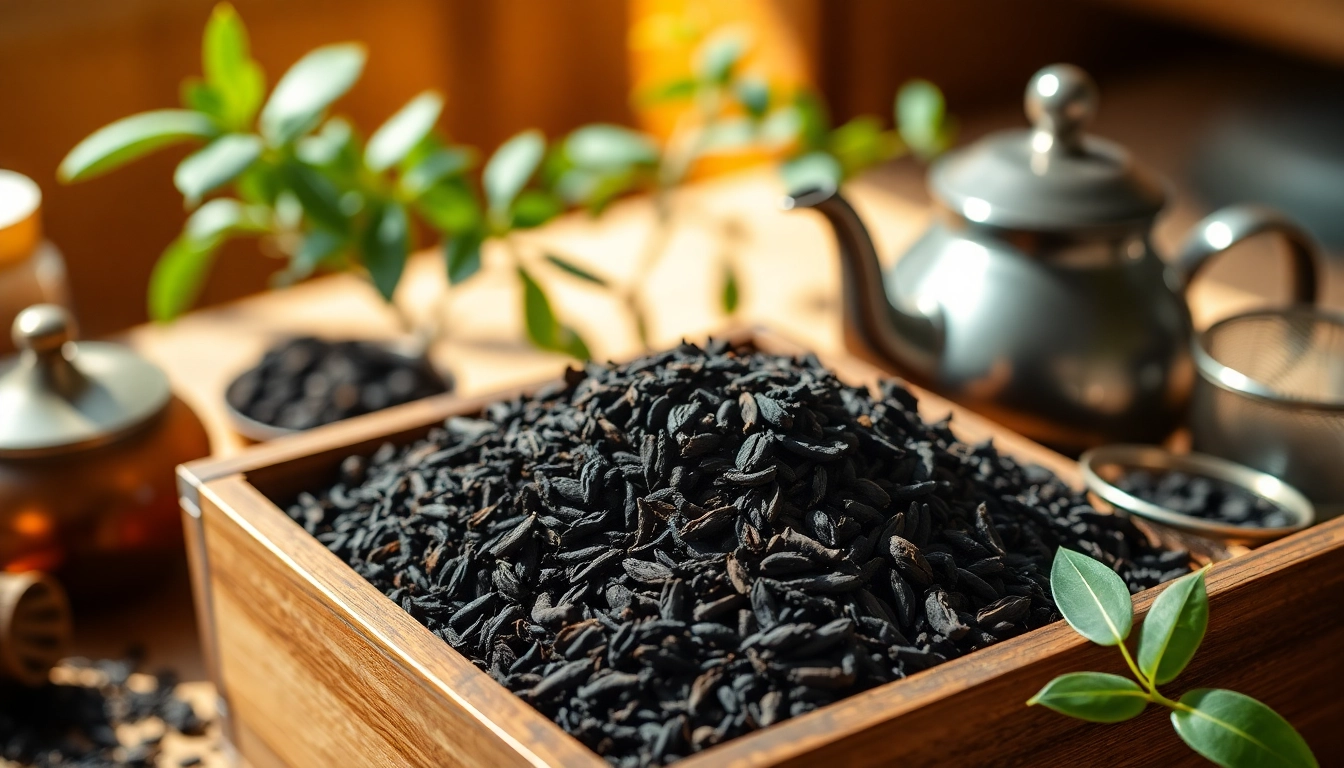The Essence of Loose Leaf Black Tea
In the world of tea, loose leaf black tea stands as a distinguished favorite among connoisseurs and casual drinkers alike. Unlike conventional bagged teas, loose leaf varieties utilize whole leaves that allow for a richer infusion of flavors and aromas. This culinary gem accentuates the unique characteristics inherent in different tea sources around the globe. A well-prepared cup of loose leaf black tea not only delights the palate but also offers various health benefits, making it a staple for many tea enthusiasts.
What is Loose Leaf Black Tea?
Loose leaf black tea is made primarily from leaves of the Camellia sinensis plant, which undergo an oxidation process that gives the tea its dark color and robust flavor. Unlike tea bags, loose leaf tea is prepared using whole or larger pieces of leaves, which expand during infusion to release a full spectrum of flavor compounds. This method of preparation is revered for preserving the integrity and richness of the tea’s character.
History and Origin of Black Tea
Black tea traces its origins back thousands of years to ancient China, where it was first discovered. The process of oxidation, an essential step in black tea production, allowed tea leaves to oxidize fully, resulting in the deep color and robust flavor profile. It wasn’t until the Tang Dynasty (618–907 AD) that black tea began to spread beyond China, eventually reaching the West during the 16th century. Today, countries like India, Sri Lanka, and Kenya are prominent producers, each contributing their distinct flavor profiles influenced by local growing conditions and processing techniques.
Key Benefits of Loose Leaf Black Tea
Drinking loose leaf black tea is not only a sensory experience but also comes with a wealth of benefits:
- Rich in Antioxidants: Packed with polyphenols and flavonoids, black tea is noted for its high antioxidant content, which combats oxidative stress and supports heart health.
- Improved Mental Alertness: The caffeine content in black tea promotes alertness and enhances cognitive functions, making it an excellent choice for busy mornings.
- Digestive Aid: The compounds in black tea can help regulate digestion and reduce bloating.
- Cardiovascular Health: Studies have shown that regular consumption of black tea may contribute to lower blood pressure and improved cholesterol levels.
Choosing the Right Loose Leaf Black Tea
The vast array of loose leaf black teas available can be overwhelming. Understanding the various factors can help you select the right tea for your palate.
Understanding Different Types of Black Tea
Black tea is categorized primarily by its origin and processing methods. Here are some popular types:
- Assam: Originating from India, Assam tea is known for its malty flavor and briskness, making it ideal for a strong morning brew.
- Darjeeling: Often referred to as the “Champagne of teas,” Darjeeling is light and floral, offering a delicate flavor that varies by harvest and growing season.
- Ceylon: Hailing from Sri Lanka, Ceylon teas are characterized by their bright, tangy flavor and refreshing qualities.
- Keemun: This Chinese black tea is known for its sweet and fruity notes along with a mild smokiness.
How to Select Quality Loose Leaf Black Tea
When evaluating loose leaf black tea, consider the following criteria:
- Leaf Size and Appearance: High-quality black tea should have whole leaves or larger broken leaves rather than dust or fannings, which are common in lower-grade teas.
- Aroma: Before brewing, give your tea a sniff. Fresh, high-quality leaves will have a pronounced and aromatic scent.
- Color: The color of the dry leaves should be vibrant, with no signs of dullness or browning, which indicates staleness.
Popular Loose Leaf Black Tea Varieties
Several varieties stand out among loose leaf black teas:
- Earl Grey: A classic blend infused with bergamot oil, providing a floral aroma and citrusy flavor.
- English Breakfast: A robust blend of various black teas, perfect for a hearty breakfast and traditionally served with milk.
- Masala Chai: A spiced tea blend from India, often made with Assam black tea, mixed with various spices and milk.
- Yunnan: Known for its rich and slightly sweet flavor, Yunnan black tea is sourced from the Yunnan province in China and is often noted for its fine golden tips.
Brewing Techniques for Perfect Tea
Once you’ve selected your loose leaf black tea, brewing it correctly is essential to unlocking its full potential.
Optimal Temperature and Time for Brewing
The temperature and steeping time are crucial for extracting the flavors without bitterness:
- Temperature: Black tea requires boiling water, preferably around 200°F to 212°F (93°C – 100°C).
- Steeping Time: Steep the tea for 3 to 5 minutes, adjusting as per personal taste preferences. A longer steep time results in a bolder flavor, while shorter steeping yields a more delicate cup.
Tools for Brewing Loose Leaf Black Tea
Using the right tools can enhance the brewing process:
- Tea Infuser: Mesh or basket infusers allow loose leaves to expand while preventing them from floating freely in the cup.
- French Press: Great for larger quantities, a French press can retain flavors while keeping the leaves contained.
- Teapot: A traditional teapot can be both functional and aesthetic, particularly when serving guests.
Common Mistakes to Avoid When Brewing
To avoid an unremarkable cup, keep these common missteps in mind:
- Using Water That’s Too Cold: It’s essential to use boiling water to extract the necessary flavor compounds.
- Oversteeping: Leaving tea leaves in water for too long can result in bitterness.
- Incorrect Tea-to-Water Ratio: A general rule is to use one teaspoon of loose leaf tea per cup of water. Adjust to taste, especially for stronger blends.
Loose Leaf Black Tea and Health
Loose leaf black tea is more than just a delightful beverage; it has various health benefits that have been recognized over centuries.
Antioxidants and Their Benefits
The antioxidants found in loose leaf black tea, primarily polyphenols, play a significant role in protecting the body against free radicals. Regular consumption can lead to:
- Reduction in the risk of chronic diseases, such as heart disease and certain cancers.
- Support in weight management and metabolic health.
- Improvement in skin health due to anti-inflammatory properties.
Impact on Mental and Physical Well-being
The caffeine content in black tea acts as a natural stimulant, enhancing mental clarity and reducing fatigue. Moreover, black tea is linked to lower stress levels, making it a comforting drink for many. Regular sips can integrate a little cauldron of serenity into a bustling day.
Loose Leaf Black Tea in Traditional Medicine
Loose leaf black tea has been used in various traditional medicine practices. For instance:
- Chinese Medicine: Black tea is often utilized to aid digestion and improve gut health.
- Ayurveda: Black tea is used for its warming properties, balancing Vata and Kapha doshas while improving circulation.
Incorporating Loose Leaf Black Tea Into Your Lifestyle
There are countless ways to enjoy and incorporate loose leaf black tea into your daily habits.
Pairing Tea with Food
Loose leaf black tea’s rich, full-bodied flavors can complement various foods:
- Breakfast Items: Pairs excellently with hearty cereal, buttered toast, or morning pastries, enhancing the overall dining experience.
- Lunch and Dinner: Serve robust black teas like Assam with spicy dishes, while lighter varieties like Darjeeling complement lighter fare.
- Desserts: Chocolate cakes and pastries go perfectly with a bold cup, providing a beautiful contrast.
Creating Unique Blends at Home
Home blending allows you to customize flavors:
- Herbs: Mix black tea with mint, lemongrass, or lavender for an aromatic twist.
- Spices: Combine with chai spices such as ginger, cardamom, and cloves for a warming drink.
- Fruits: Adding dried fruits like orange peel or apple can create unique, refreshing flavors in your cup.
Tea Rituals and Mindfulness Practices
Incorporating tea rituals into your day can enhance mental well-being and promote mindfulness:
- Mindful Brewing: Use the brewing process as a form of meditation, focusing on each step from boiling water to steeping.
- Tea Meditation: Allow the aroma and flavor while sipping to center your thoughts and reduce anxiety.



